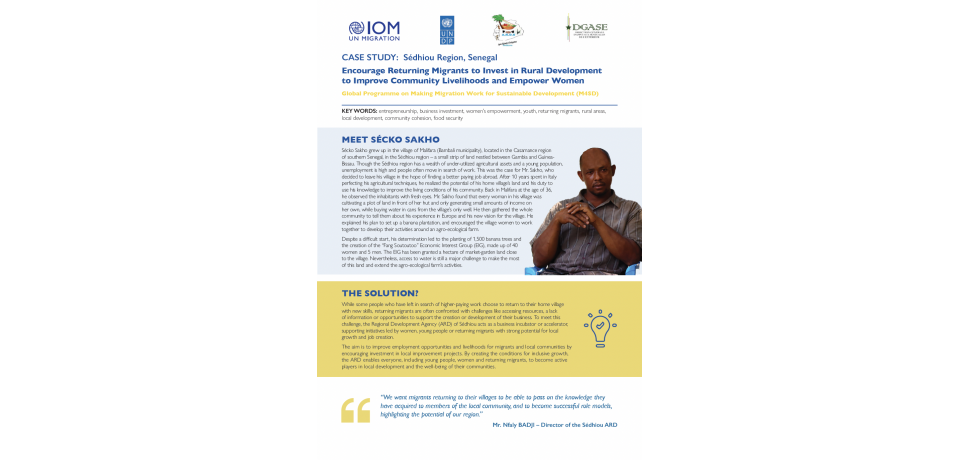CASE STUDY: Encourage Returning Migrants to Invest in Rural Development to Improve Community Livelihoods and Empower Women
Related Sustainable Development Goals and Global Compact for Migration Objectives
Mr. Sécko Sakho grew up in the Malifara village in the Sédhiou region in southern Senegal. In Sédhiou, there is a wealth of under-utilized agricultural assets and a young population, but unemployment is high and people often leave in search of work. Mr. Sakho also decided to leave his village to find higher-paid work abroad. After spending 10 years in Italy, he recognized the potential of Malifara’s land and decided to return home. Noticing some missed opportunities in Malifara, he organized community members, especially women, to work together to develop an agro-ecological farm. They have now created the “Fang Soutoutoo” Economic Interest Group (EIG), made up of 40 women and 5 men who work together toward a sustainable and peaceful future.
The Regional Development Agency (ARD) of Sédhiou supports initiatives that have strong potential for local growth and job creation, whether led by local community members or returning migrants like Mr. Sakho. The ARD aims to improve employment opportunities and sustainable livelihoods for migrants and local communities by encouraging investment in local improvement projects.
How can organizations like the ARD invest in entrepreneurs and forward-looking thinkers like Mr. Sakho in order to make a difference for the whole community? How can the creation of strong Economic Interest Groups (EIGs) promote gender equality and empower women workers to become active players in local development?
Read the case study (English and French) to find out how and read 4 tips that we learned from putting this approach into practice, including: targeting businesses with high potential to promote the creation of decent jobs in rural areas; establishing clear and inclusive selection criteria and communicating them to local communities and returning migrants; supporting the economic empowerment of women in rural areas; and capitalizing on the skills and knowledge acquired by returnees to benefit the community.
These activities are carried out through the IOM-UNDP Global Joint Programme Making Migration Work for Sustainable Development (M4SD) which supports Senegalese local and national governments, the private sector and community organizations to establish community-led solutions that empower migrants and create inclusive opportunities for all. When partners empower migrants and businesses, local economies, infrastructure and sustainable development is enhanced (Sustainable Development Goals 2, 5, 6, 8, 9, 10 and 16).
Learn more about our work in Senegal.
